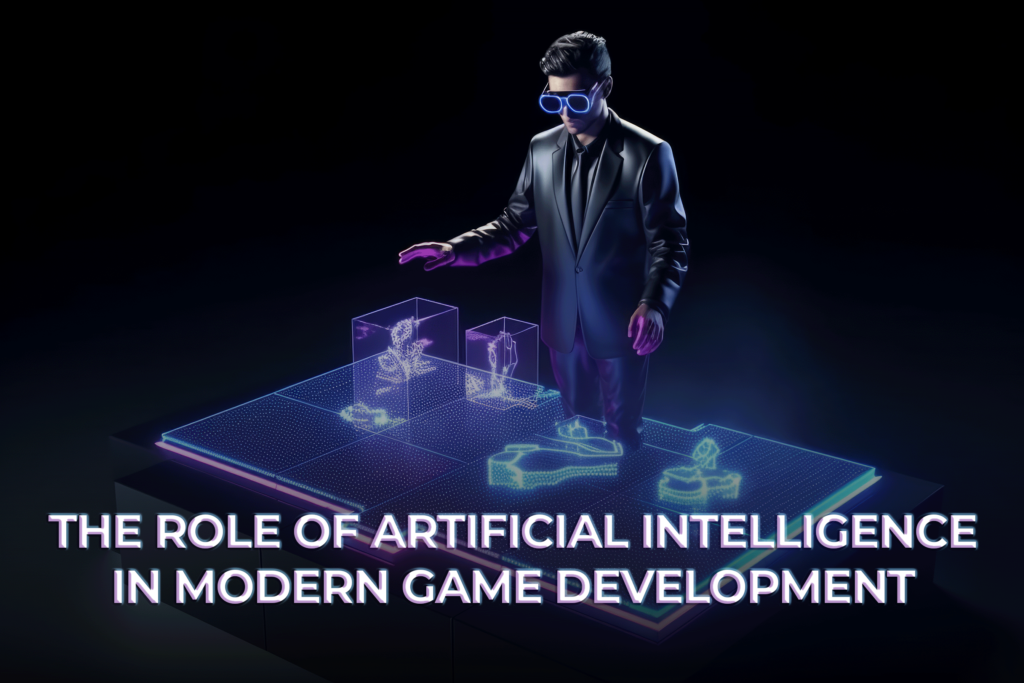AI has completely changed a lot of fields, and the development of games is not uncommon. In the present environment, AI helps create immersive and interesting experiences and improves gaming. Using AI, developers create complicated settings, create intelligent non-playable characters (NPCs), and customize user experiences according to player actions. New degrees of realism and interaction are promised by the use of AI, which makes it an essential tool in the toolbox of the contemporary developer. The Role of Artificial Intelligence in Modern Game Development and its effects on the gaming business overall will be discussed in this article.

What is the Role of AI in Gaming?
In gaming, artificial intelligence is the use of machine learning methods and algorithms to provide responsive and dynamic gameplay. AI allows games to adjust in real-time to player actions, unlike conventional programming techniques that depend on prewritten scripts. More advanced non-playable characters (NPCs) that may learn and develop as a result of this flexibility provide a more engaging and difficult experience. Procedural content generation is another aspect of AI in games that enables large and varied settings to be create with little human effort. Developers may include AI in developing games that provide players with many options and individual experiences.
How Does AI Work in Games?
Algorithms, data structures, and machine learning methods used in games’ artificial intelligence to provide dynamic, responsive gameplay. Fundamentally, game AI depends on decision-making mechanisms shaped by player and game environment behavior. Finite State Machines (FSMs) are one popular technique in which characters change between states such as idle, attack, or patrol according to preset criteria. Behavior trees are another method to arrange complicated decision-making into a more controllable hierarchical framework.
Another important function is played by machine learning, especially by neural networks. By enabling NPCs and gaming settings to learn and anticipate player actions, these networks provide more realistic and unexpected behaviors. Characters may be train to modify their tactics in real time using reinforcement learning, for example, to become more difficult opponents.
Benefits of AI in Game Development:
There are many benefits to including artificial intelligence in the development of games, improving the creation process and the user experience. One of the main benefits of creating intelligent NPCs with lifelike behaviors is an immersive and realistic gaming experience. Because these non-player characters can adjust to player actions, every encounter is different and difficult, which lengthens and makes games more replayable.
AI also speeds up the development process by taking up positions that has done repeatedly. Procedure-based content generation (PCG) lets writers create huge, varied game worlds with much less human work. This not only speeds up the production process but also allows smaller studios to make material that is just as good as that produced by bigger companies.
Artificial intelligence-driven analytics provide developers with priceless insights into player actions, allowing them to perfect gaming mechanics and design aspects. By immediately spotting and resolving problems, real-time data collection and analysis contribute to optimizing the gaming experience and guaranteeing increased player happiness and retention.
AI customizes gaming. Based on each player’s preferences and performance, machine learning algorithms allow games to change stories, recommend in-game material, or adapt difficulty levels. This degree of personalization promotes an even more captivating experience, strengthening the emotional connection between the player and the game.
AI provides multiple benefits for game development, including better NPC behaviors, faster content generation, perceptive analytics, and customized gaming experiences. These developments not only improve the quality of games but also provide creators with modern tools to push the bounds of what is thought to be feasible in the industry.
Conclusion:
The way that current games developed has been much improved for players by the use of AI. AI has completely changed the creation and play of games, from producing more lifelike virtual opponents to creating original and exciting material. The applications for AI in game development are almost limitless as long as technology keeps developing, and we may anticipate even more fascinating developments in the future. It follows that AI will probably continue to have a major influence on how gaming develops in the future. Let’s therefore welcome the developments and see where AI in the gaming industry leads us next! Also, accept the the role of Artificial Intelligence in modern game development as it is changing the way of playing.




